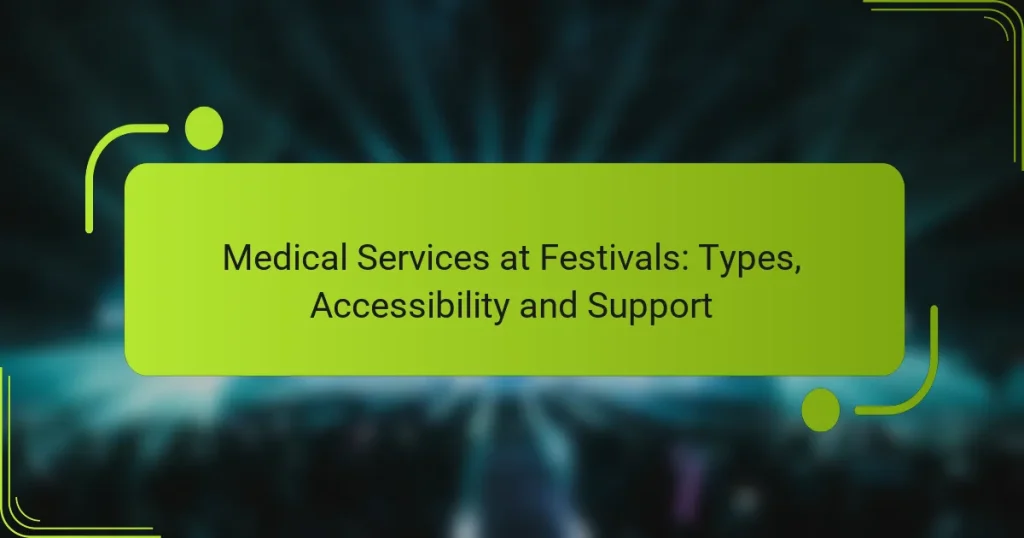Medical services at festivals play a crucial role in ensuring the health and safety of attendees, offering a variety of resources such as first aid stations, emergency medical services, and on-site medical tents. Accessibility to these services can vary based on location and available resources, making it important for attendees to familiarize themselves with the specific arrangements in place. Additionally, many festivals provide mental health support services, including hotlines and on-site counseling, to help participants manage stress and emotional challenges during the event.
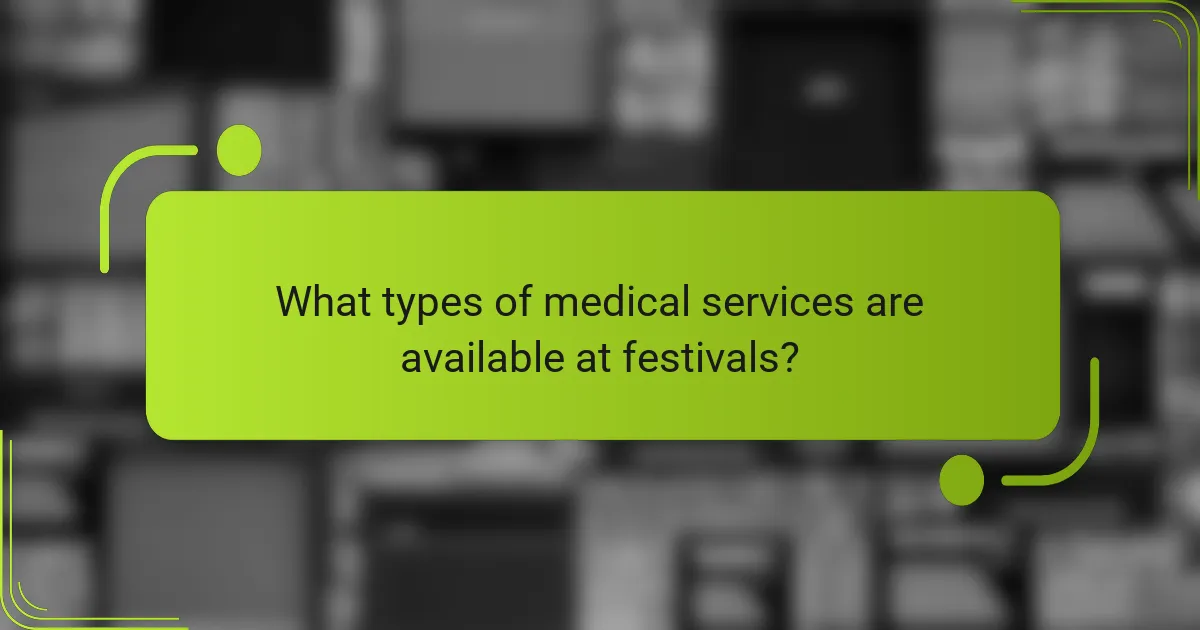
What types of medical services are available at festivals?
Festivals typically offer a range of medical services to ensure the health and safety of attendees. These services include first aid stations, emergency medical services, on-site medical tents, mobile health units, and telehealth services, each designed to address different medical needs.
First aid stations
First aid stations are essential for providing immediate care for minor injuries and health issues at festivals. These stations are usually staffed by trained volunteers or medical personnel who can handle cuts, bruises, dehydration, and other common ailments.
Attendees should locate the nearest first aid station upon arrival and keep it in mind for quick access. It’s advisable to carry basic first aid supplies, but knowing where to go for more serious issues is crucial.
Emergency medical services
Emergency medical services (EMS) are vital for addressing serious health emergencies at festivals. These services are typically provided by local ambulance services and are equipped to handle life-threatening situations, such as cardiac arrests or severe injuries.
Festivals usually have designated pathways for EMS vehicles to ensure rapid response times. Attendees should familiarize themselves with the festival layout to know how to direct emergency personnel if needed.
On-site medical tents
On-site medical tents serve as temporary clinics where more comprehensive medical care can be provided. These tents are staffed by healthcare professionals who can manage a wider range of medical issues, from minor surgeries to consultations.
It’s important for festival organizers to ensure these tents are well-stocked with medical supplies and equipment. Attendees should not hesitate to seek help at these tents for any health concerns that arise during the event.
Mobile health units
Mobile health units are specialized vehicles that provide medical care directly at the festival site. These units can offer services like vaccinations, health screenings, and basic medical consultations.
Having mobile health units on-site can significantly enhance accessibility to healthcare, especially in larger festivals. Attendees should look for announcements regarding the location and services offered by these units throughout the event.
Telehealth services
Telehealth services are increasingly being integrated into festival medical offerings, allowing attendees to consult with healthcare professionals remotely. This can be particularly useful for non-urgent medical advice or follow-up consultations.
Festivals may provide access to telehealth platforms via Wi-Fi or designated areas where attendees can connect with healthcare providers. It’s a convenient option for those who prefer not to visit a physical location for minor health issues.
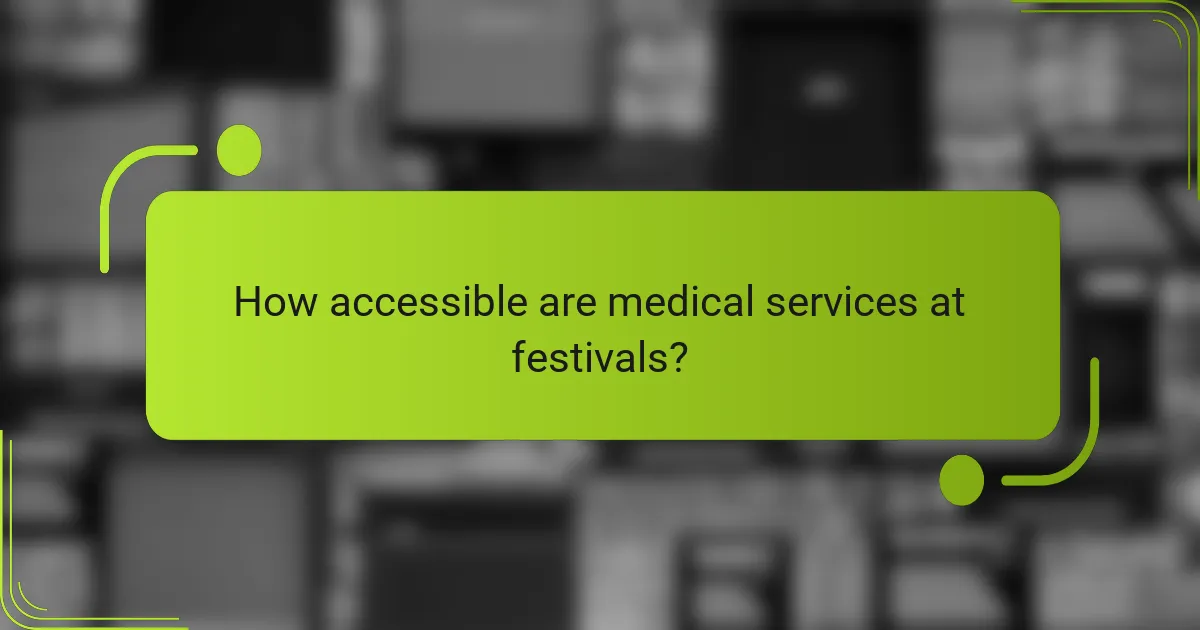
How accessible are medical services at festivals?
Medical services at festivals vary in accessibility based on location, compliance with regulations, and available resources. Many festivals strive to provide adequate medical care, but attendees should be aware of the specific arrangements in place to ensure timely assistance.
ADA compliance standards
ADA compliance standards require that medical facilities at festivals be accessible to individuals with disabilities. This includes features such as wheelchair ramps, accessible restrooms, and designated parking spaces. Festivals must ensure that medical staff are trained to assist attendees with various needs.
To verify compliance, attendees can check the festival’s official website or contact organizers directly. Understanding these standards can help individuals plan their visit and ensure they receive necessary support.
Location of medical facilities
Medical facilities at festivals are typically located near main entrances or central areas to ensure quick access. It’s common for larger festivals to have multiple first aid stations spread throughout the venue. Familiarizing oneself with the layout can save valuable time in case of an emergency.
Attendees should look for maps or signage indicating medical facility locations upon arrival. Knowing where to go can significantly reduce stress during an urgent situation.
Transportation options for medical emergencies
Transportation options for medical emergencies at festivals often include on-site ambulances and designated pathways for emergency vehicles. Some festivals may also provide shuttle services to nearby hospitals for more serious cases. Understanding these options can be crucial for quick response times.
Attendees should inquire about transportation protocols before the event. Being aware of how to access these services can help ensure that any medical emergencies are handled efficiently and effectively.
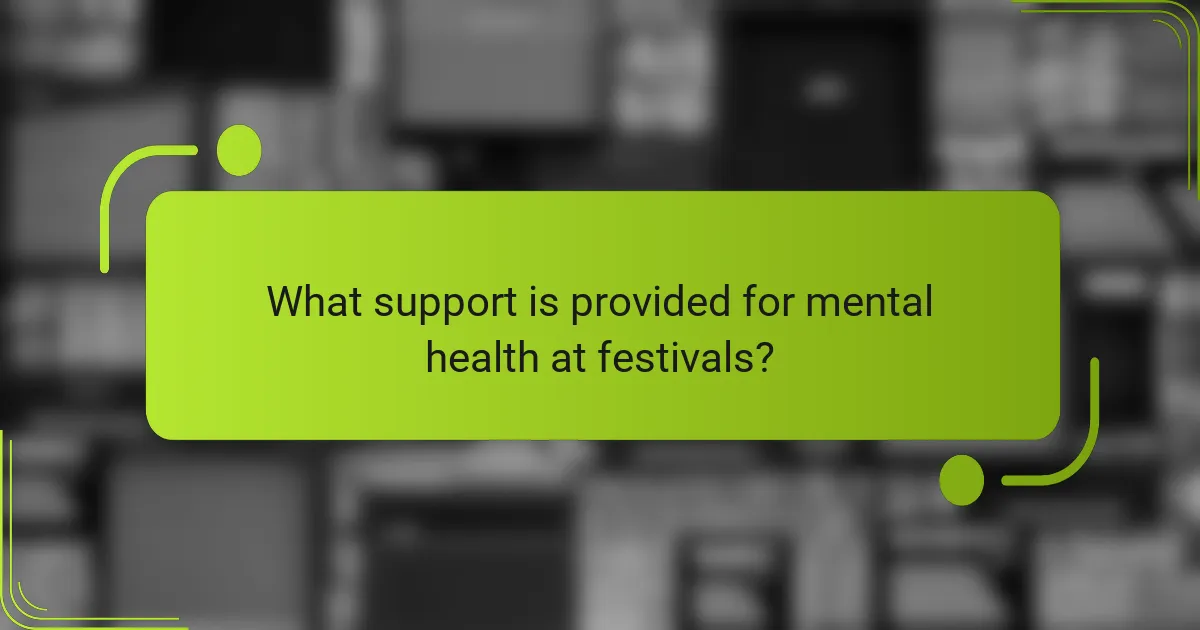
What support is provided for mental health at festivals?
Festivals often provide various mental health support services to ensure attendees can manage stress and emotional challenges. These services typically include hotlines, on-site counseling, and support groups, all aimed at promoting mental well-being during the event.
Mental health hotlines
Mental health hotlines at festivals offer immediate assistance for those experiencing distress. These hotlines are staffed by trained professionals who can provide support, guidance, and resources 24/7 throughout the event.
Attendees can easily access these hotlines via posted numbers in common areas or through festival apps. It’s advisable to save the hotline number in your phone for quick access if needed.
On-site counseling services
Many festivals feature on-site counseling services where individuals can speak with mental health professionals in a private setting. These services are typically available during festival hours and can help address immediate concerns or provide coping strategies.
Participants can seek counseling for various issues, from anxiety to overwhelming emotions. It’s important to know that these services are confidential and designed to create a safe space for attendees.
Support groups and workshops
Support groups and workshops at festivals provide a communal approach to mental health, allowing attendees to share experiences and learn coping techniques. These sessions often focus on specific topics such as stress management, mindfulness, or dealing with festival-related anxiety.
Joining a support group can foster a sense of community and help individuals feel less isolated in their experiences. Workshops are typically scheduled throughout the festival, so checking the event schedule can help you find sessions that suit your needs.
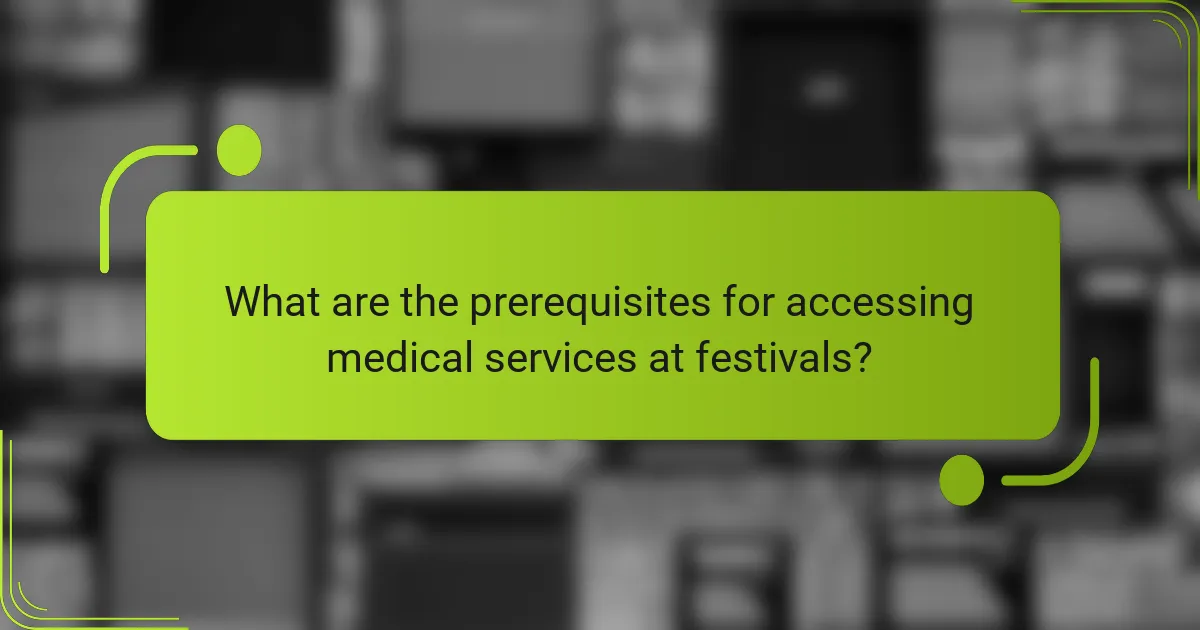
What are the prerequisites for accessing medical services at festivals?
Accessing medical services at festivals typically requires attendees to meet certain prerequisites, including having a valid ticket and being aware of their health insurance coverage. Understanding these requirements can ensure prompt and effective medical assistance when needed.
Ticket purchase requirements
To access medical services at festivals, attendees usually need to have a valid ticket. This ticket serves as proof of entry and may be required to receive any medical assistance on-site. Some festivals may also provide specific medical access wristbands for attendees with pre-existing conditions.
It’s advisable to check the festival’s official website for any specific ticket-related medical access policies. For instance, some events may offer different tiers of tickets that include additional medical support services.
Health insurance considerations
Health insurance can play a crucial role in accessing medical services at festivals. Attendees should verify whether their insurance covers medical treatment received at the festival location. Many insurance plans may have limitations on out-of-network services, which can affect coverage.
Additionally, it’s wise to carry a copy of your insurance card and know the contact information for your provider. This can expedite care and ensure that any necessary follow-up treatment is covered. If traveling internationally, consider purchasing travel insurance that includes medical coverage for festival attendance.
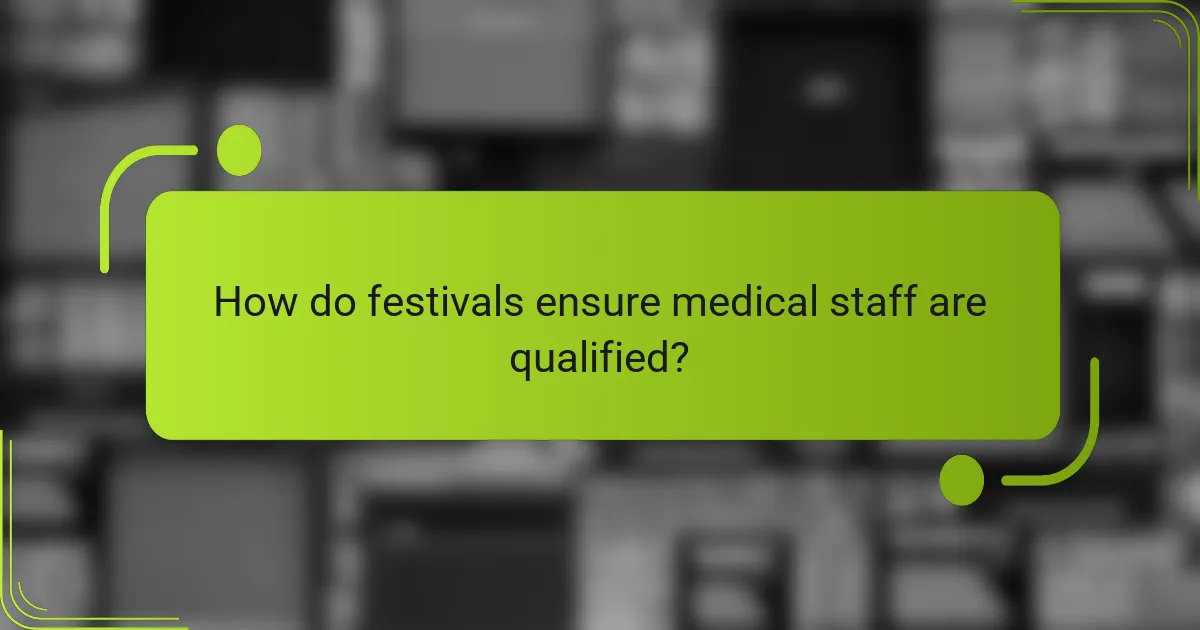
How do festivals ensure medical staff are qualified?
Festivals ensure medical staff are qualified by adhering to specific certification standards and collaborating with local healthcare facilities. This process guarantees that the personnel on-site possess the necessary skills and knowledge to handle medical emergencies effectively.
Certification requirements
Medical staff at festivals typically must hold certifications from recognized organizations, such as the American Heart Association or equivalent bodies in other countries. Common certifications include Basic Life Support (BLS) and Advanced Cardiac Life Support (ACLS).
In addition to these certifications, many festivals require staff to have experience in emergency medical services (EMS) or similar fields. This experience can range from several months to a few years, depending on the festival’s size and expected medical needs.
Partnerships with local hospitals
Festivals often establish partnerships with local hospitals to ensure a seamless response to medical emergencies. These collaborations allow for quick access to advanced medical care and resources, which is crucial during large events.
Such partnerships may include agreements for rapid transport of patients to hospitals, as well as on-site consultations from hospital staff. Festivals may also conduct drills with local emergency services to prepare for potential incidents, enhancing overall safety for attendees.
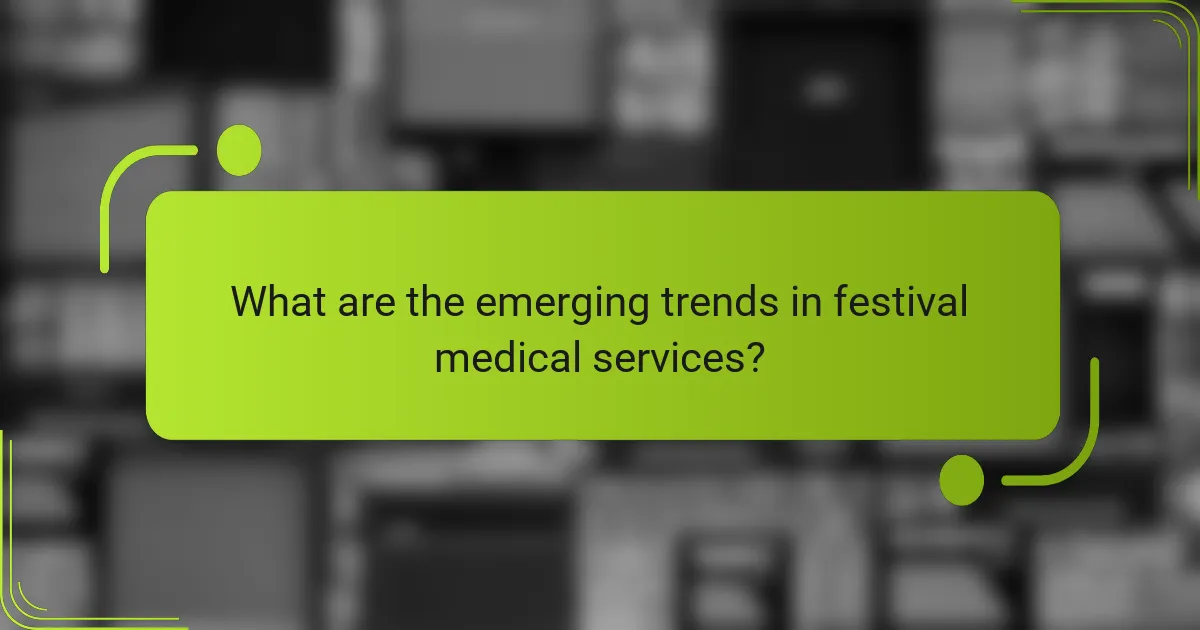
What are the emerging trends in festival medical services?
Emerging trends in festival medical services focus on enhancing accessibility, integrating technology, and improving response times. These trends aim to provide better care for attendees while ensuring that medical teams are equipped to handle a range of situations effectively.
Increased use of telemedicine
Telemedicine is becoming increasingly popular at festivals, allowing medical professionals to consult with patients remotely. This approach can reduce wait times and streamline care, especially for non-emergency situations. Attendees can receive guidance via mobile apps or dedicated telehealth stations set up on-site.
For example, festivals may offer virtual consultations for minor ailments, enabling quick assessments without the need for physical examinations. This trend not only enhances convenience but also helps to manage the flow of patients in crowded medical tents.
Mobile health units
Mobile health units are being deployed to provide immediate medical assistance at festivals. These units are equipped with essential medical supplies and staffed by trained personnel, ensuring rapid response to emergencies. They can handle a variety of situations, from minor injuries to more serious health issues.
Festivals are increasingly incorporating these units into their safety plans, allowing for better coverage across large areas. Attendees can easily locate these units through festival maps or apps, which improves overall accessibility to medical services.
Focus on mental health support
There is a growing emphasis on mental health support at festivals, recognizing the importance of psychological well-being alongside physical health. Many festivals now offer dedicated spaces for mental health services, staffed by professionals trained to assist with anxiety, stress, and other mental health concerns.
Providing resources such as counseling and relaxation areas helps create a more supportive environment for attendees. This approach not only addresses immediate mental health needs but also promotes a culture of care and awareness within the festival community.
Improved training for medical staff
Training for medical staff at festivals is evolving to include specialized skills tailored to the unique challenges of large events. This includes training in crowd management, emergency response, and specific health issues prevalent in festival settings, such as substance use or heat-related illnesses.
By enhancing the skill set of medical personnel, festivals can ensure that their teams are better prepared to handle diverse situations effectively. Regular drills and simulations can further improve readiness and response times during actual events.
